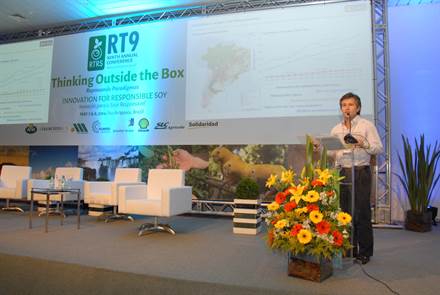
Mobilizing knowledge on the soy story at the Round Table on Responsible Soy
With the theme ‘Thinking Outside the Box’, the Ninth Annual Meeting of the Round Table (RT9) on Responsible Soy (RTRS) in Brazil from 7-8 May, aimed to capture ideas on how to introduce innovation to the world of responsible soy. Supporting this vibe, ProYungas and Wetlands International presented the Socio-Environmental Observatory on Soy (OSAS), the first database that systematically monitors the expansion and social and environmental impacts of soy in Argentina, Paraguay, Bolivia and Brazil.[1]
The RTRS is still in its early stages compared to other roundtables for sustainable commodities; however the need for action is high. Soybean is the fastest expanding crop in the world. In just 50 years, overall production has grown tenfold, from 27 to 269 million tones, and will almost double by 2050, according to FAO. Wetlands and other ecosystems are highly threatened by the growing expansion of this agricultural frontier.
One of the main challenges now facing the RTRS that was discussed at RT9 is to overcome the low demand for certified soy from the market. The lack of a stronger commitment and awareness of the industry and retail to buy RTRS certified soy is delaying this scheme to take off faster.
As we see in the palm oil and pulp wood industry, an increasing number of giant production and buying companies are announcing their commitments to sustainable production, which includes no deforestation and no wetland conversion. Access to knowledge about trends and socio-economic and environmental impacts of the industry plays a vital role in this shift.
|
|
And that is exactly what the Socio-Environmental Observatory on Soy can provide. It facilitates a number of important processes. First of all, improved knowledge on trends and impacts of soy cultivation underlines the urgent need for standards like RTRS. Secondly, impact data provide guidance to priority areas for RTRS and input for tracking progress on whether companies are meeting the RTRS principles and criteria.
While the soy observatory database is still in development, we could already present the first results to the participants of the RT9 meeting. One example is that of the Saladillo’s marshes, at the heart of the most productive soy area in Argentina, where 70% of the marshes surface was lost in the last four decades and almost 20% of their lagoons.
The RTRS released the first version of its standard on responsible soy production in 2011, which includes principles that promote, among others, the protection of wetlands and their environment. This is urgent as in many cases wetlands are considered an obstacle to agriculture and are drained and reclaimed as agricultural land to increase the production area. This leads to the loss and degradation of wetlands, impacting biodiversity and key services that they provide, including flood risk reduction, provision of potable water and forage production for livestock.
As expressed by Daniel Blanco, Director of Wetlands International Argentina: “From our experience, the RTRS standard is one of the best tools available to push soybean production into more friendly practices. It is now vital to monitor if the RTRS scheme is achieving in practice, in the field, what it sets out in the papers”.
OSAS also aims to directly inform different sectorial agendas of both the private and public sectors and land planning laws. In the specific case of wetlands and soy, we recommend soy producing countries to avoid drainage of wetlands, prohibit cultivation in areas of high value for biodiversity conservation and into the margins of wetlands, and apply best available agricultural practices, minimizing impacts on the quality and quantity of water and preventing contamination.
Read more about soy and wetlands including more detailed recommendations for different players.
[1] The organizations participating in OSAS are ICV in Brazil, ProYungas and Wetlands International Argentina, Guyrá Paraguay in Paraguay and Probioma in Bolivia. OSAS is supported by Wetlands International, Both Ends and IUCN NL.
Download:
Wetlands International Position Statement and Recommendations for the RTRS Standard for Responsible Soy Production.
More information:
Contact: Jan Heinrich, Coordinator of the Soy and Wetlands Program, Wetlands International Argentina.
Wetlands International is a member of the Round Table on Responsible Soy (RTRS) since 2010.

